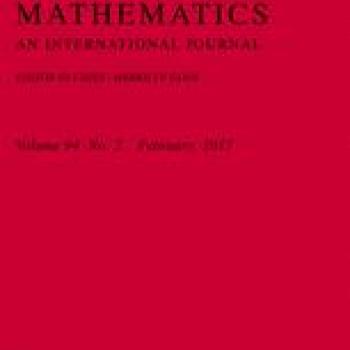Publication Information

After improving enrolment rates significantly, many developing countries such as Peru are facing the challenge to increase learning levels among students. Over the past few years, many researchers have turned to teacher-related variables as a way to better understand classroom processes that may help increase learning levels among students.
In this study, we analyze one of these, that falls under what Shulman (Educational Researcher, 15 (2), 4–14, 1986) called pedagogical content knowledge (PCK). Specifically, in this study, we analyze one of the areas of PCK which is knowledge of content and students. This was measured through a test where teachers were asked to explain students’ mistakes and predict responses in similar mathematics exercises. We explore if PCK is associated with the socioeconomic status of children and if it has an effect on children’s achievement.
Additionally, we analyze which teacher characteristics are associated with higher scores in PCK. The analysis uses the Young Lives longitudinal survey for Peru. We found that students’ socioeconomic status at age 1 and maternal education were positively associated with their teachers’ PCK by the time students were enrolled in fourth grade, thus depicting a very unequal education system. Furthermore, teachers’ PCK was positively associated with student achievement, but only when a threshold for the PCK test was established. For our sample, male teachers, who were younger, and Spanish speakers had higher PCK scores.
KeywordsPedagogical content knowledge, mathematics, achievement,Peru,socioeconomic status,longitudinal study
Downlaod the journal article Teachers’ pedagogical content knowledge and mathematics achievement of students in Peru.

After improving enrolment rates significantly, many developing countries such as Peru are facing the challenge to increase learning levels among students. Over the past few years, many researchers have turned to teacher-related variables as a way to better understand classroom processes that may help increase learning levels among students.
In this study, we analyze one of these, that falls under what Shulman (Educational Researcher, 15 (2), 4–14, 1986) called pedagogical content knowledge (PCK). Specifically, in this study, we analyze one of the areas of PCK which is knowledge of content and students. This was measured through a test where teachers were asked to explain students’ mistakes and predict responses in similar mathematics exercises. We explore if PCK is associated with the socioeconomic status of children and if it has an effect on children’s achievement.
Additionally, we analyze which teacher characteristics are associated with higher scores in PCK. The analysis uses the Young Lives longitudinal survey for Peru. We found that students’ socioeconomic status at age 1 and maternal education were positively associated with their teachers’ PCK by the time students were enrolled in fourth grade, thus depicting a very unequal education system. Furthermore, teachers’ PCK was positively associated with student achievement, but only when a threshold for the PCK test was established. For our sample, male teachers, who were younger, and Spanish speakers had higher PCK scores.
KeywordsPedagogical content knowledge, mathematics, achievement,Peru,socioeconomic status,longitudinal study
Downlaod the journal article Teachers’ pedagogical content knowledge and mathematics achievement of students in Peru.

